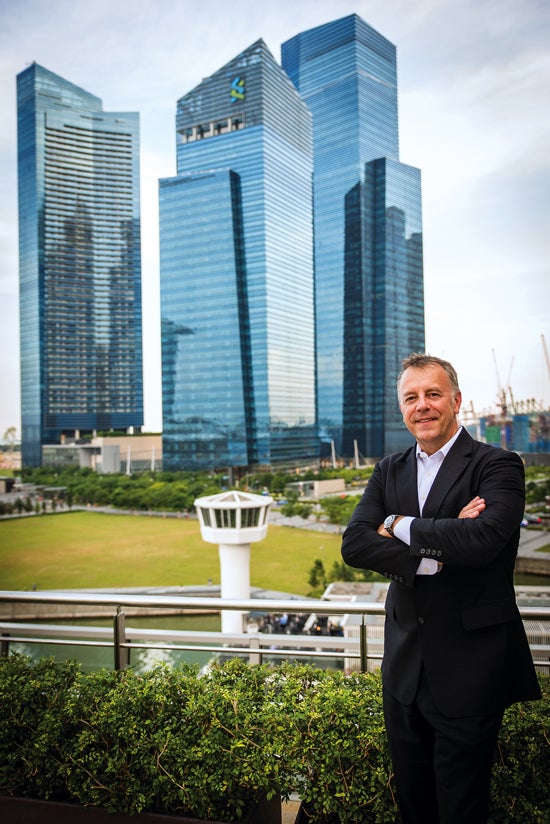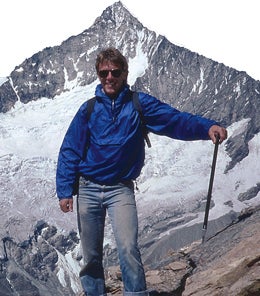Global Impact

Growing up in a small Connecticut town, Scott Singer ’83 says “a trip to Rhode Island was like a trip to the moon.” Back then, he never dreamed of bartending in New Zealand, driving heavy equipment on the frozen landscape of Antarctica, or traveling the world—business class. Now, he has landed in the perfect spot for his highly developed sense of wanderlust: executive vice president and head of global business services at Rio Tinto, a British-Australian multinational metals and mining corporation. The Singapore resident was en route to India when he took a minute to fill us in on self-driving trucks, love at a college reunion, and how it all started when he transferred to URI.
You grew up in Wallingford, Connecticut. What made you decide to attend URI?
I spent my freshman year at the University of Colorado in Boulder. I felt that the school was too big and wanted to get back to New England. URI was far enough away from Connecticut to be different culturally and yet still in New England, so I transferred for my sophomore year. I felt very comfortable with the campus.
When did you know you wanted to study geology?
My mother was pursuing a master’s degree in geology at the same time I was starting my undergraduate degree. I knew that I wanted to pursue the sciences or engineering, and the geology curriculum resonated with me. It also gave me something to share with my mother. We actually had the good fortune to work on a couple of projects together as geologists in the mid 1980s.
 If you had it to do over again today, what would you study?
If you had it to do over again today, what would you study?
I would still do geology, but with more emphasis on civil engineering and geotechnical engineering.
What were your standout experiences at URI?
URI gave me a great, well-rounded experience for academics and social life. I spent my transfer year on campus and my junior and senior years “down the line.” The beach and school experience is tough to beat!
How did you get started traveling?
I spent six weeks in the summer of 1981 mountain climbing in Switzerland with Paul Ladd ‘84. That trip cemented my ambition to travel the world, and six months after graduation I bought a one-way ticket to New Zealand. I spent a year in New Zealand traveling, and then another year in Australia. I returned to the States to get my first real job as a geologist, worked for two years, and then took a leave of absence for eight months to live and work in Antarctica, then travel in Asia. I am quite sure that these early experiences have contributed to why we are living in Singapore today.
Why Antarctica?
In 1984 I was bartending in Christchurch, New Zealand, when over the course of several weeks, all of these bearded and rowdy Americans came through town. They were coming “off the ice,” jargon for completing the summer season at McMurdo Station in Antarctica. I became obsessed with experiencing that continent, and eventually got hired to drive heavy equipment and support logistics operations for the major civilian contractor supporting the U.S. National Science Foundation. The commitment was for a full summer season, which lasted from October through March. It was a remarkable experience on many levels and helped me really understand frontier living.
I’ve heard there’s a good story behind how you got married.
I met Coleen Delaney in the fall of 1980 when I first got to URI, and we dated for about two months. She lived in Dorr Hall and I lived in Coddington. We really enjoyed each other’s company, but then her family moved to Florida and she decided to become a University of Florida Gator. In 1990, for some still unknown reason, she organized a reunion of URI dorm friends, and I was on the call list—she reached me through my parents in Connecticut. We like to joke that Coleen was doing Facebook well before the Internet version came along. The spark rekindled and we have been together for 24 years, and married for 22 of them.
What drew you to procurement work—and can you explain exactly what you do?
At Rio Tinto, I run an integrated set of functions under the banner of Global Business Services, which includes procurement and inbound supply chain, information technology, real estate, finance services, and people services. To give you a feel about procurement, my team buys those monster trucks and shovels that you see on the History or Discovery channels. In fact, the first season of the History Channel’s Ice Road Truckers (history.com/shows/ice-road-truckers) was filmed at one of our diamond mines in northern Canada. What is also cool is that Rio Tinto is one of the very few mining companies today to operate these trucks autonomously—in other words, no drivers, just software.
What do you love most about your work?
What I love about my work is the diversity of the topics we deal with, shaping our technology agenda and the cultural diversity of my team. I manage employees in 45 geographies around the world and in some far flung places like Mongolia and Madagascar. It is a constant cultural learning experience and I thrive on it.
How did you get to Rio Tinto?
I spent 19 years working at United Technologies and had some wonderful experiences and was able to do a considerable amount of traveling. The only downside was that all of my assignments were Connecticut-based. I was recruited by Rio Tinto in 2008, and what really made the decision for me was the chance to move back to Australia. We spent four years there before moving to Singapore in early 2012. The change has been fantastic and has brought us to a fascinating part of the world that we are constantly exploring when time permits. We are fortunate that it is particularly easy to fly in and out of Singapore.
How did your URI experience prepare you for the work you are doing today?
I would argue that getting your undergraduate degree is the first real step in adult learning. It is foundational for furthering your formal learning into the future. My URI experience gave me this foundation and also the confidence to pursue additional avenues. I subsequently studied and obtained two master’s degrees while I was working full time.
What is the most difficult professional challenge you’ve faced?
My hardest challenge was in the 1990s as a relatively young manager at United Technologies. I was in the Pratt & Whitney division and we were going through some intense restructuring. My job required me to lay off many employees who believed in the “job for life” ideology, and quite a number of them were not well prepared for employment outside the company. This experience left a strong impact on me and reinforced my view that formal education is critical in the modern workforce. This is true even more today than it was back then.
Finally, what advice do you have for today’s graduates?
There’s a phrase I like that says it all: Live to learn and learn to live!
—Melanie Coon
 Home
Home Browse
Browse Close
Close Events
Events Maps
Maps Email
Email Brightspace
Brightspace eCampus
eCampus


